At risk of Syrianisation?
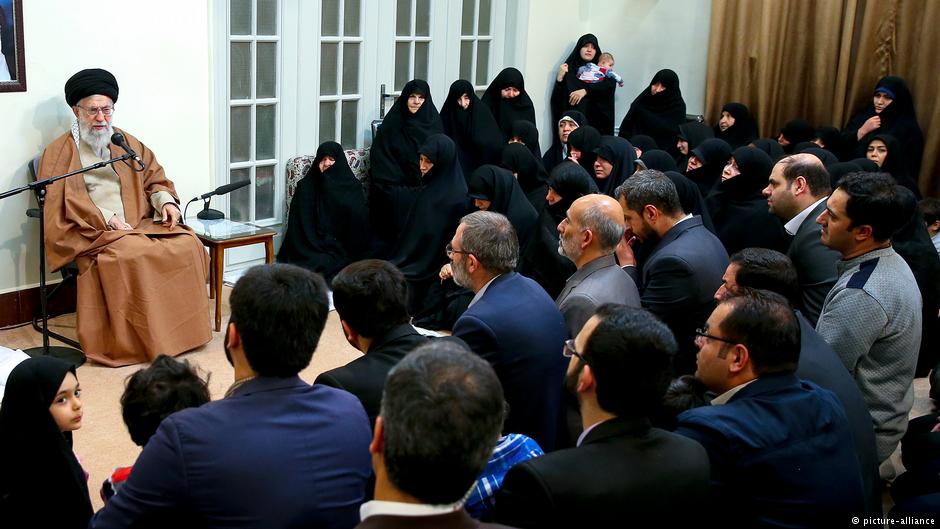
New words for new times. If this maxim is correct, then we can say that a new era dawned in Iran around four weeks ago, or, more precisely, with the unrest that swept the country at the beginning of 2018.
The neologism being used to describe this new era is "Syrianisation". Googling this word in Persian turns up hundreds of articles and essays by various authors. Observers and analysts use the word as a prognosis, forecasting that Iran will inexorably slide into a situation similar to that in Syria.
Reformers cite it as a warning against stirring up turmoil and violence. And increasingly, disappointed reformers are speaking up as well, claiming that a Syrianisation of Iran can only be prevented if its people keep on demonstrating as they demand and encourage civil disobedience.
Representatives of each camp cite a number of arguments, data and facts to back up their position – many of them thought-provoking and at times alarming.
Esteemed and influential political scientists and sociologists are participating in the debate, as are political activists who apparently have only short-term, tactical objectives in mind. And as always when debates are heated, the conspiracy theorists are not far behind. They claim that the word "Syrianisation" was coined by the intelligence service and that the hard core of political power in Iran is exploiting the appalling situation in Syria as a spectre to quell protests and demonstrations. If only it were that simple.
A powder keg
No matter how widely divergent the opinions and motives may be, there is one point on which everyone can agree: unrest is brewing underground and the rumbles preceding a major earthquake have long since begun – unmistakable for anyone who is really listening. The Islamic Republic is perched on a powder keg, wrote Mehdi Karroubi recently from his house arrest in an open letter to Ali Khamenei, the Supreme Leader and most powerful man in Iran.
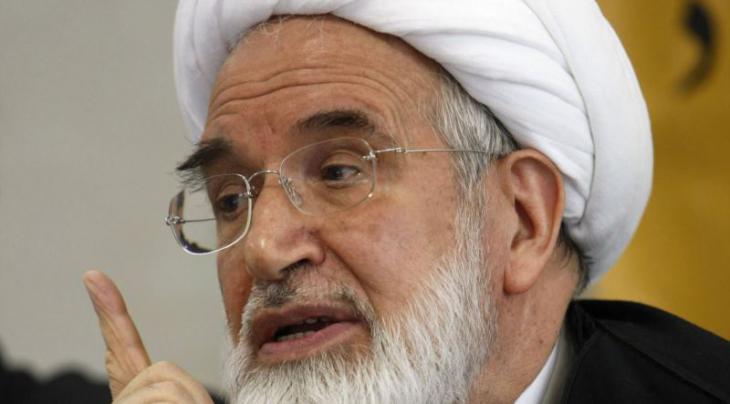
The open letter from the former parliamentary president is undoubtedly a permanent document that no historian in the future will be able to ignore in trying to describe how the theocracy came about nearly 40 years ago, how it changed over the decades and why it finally found itself at a dead end. Very few people were as close as Karroubi to the republic's founder, Ruhollah Khomeini. The Ayatollah even named Karroubi executor of his will.
Up until he was put under house arrest seven years ago, Mehdi Karroubi was part of the innermost power circle in the republic. But now, in his open letter, the 80-year-old apologises to the Iranian people for everything they have had to put up with in the four decades since the revolution. The republic is now forty years old and all those who were or are its leaders should finally admit that they are responsible for their country's plight, he writes, adding: "I, too, am at fault for this darkness and bitterness."Is his unsparing description of the present trouble a document of hopelessness? Is the Islamic Republic now beyond reform?
Karroubi answers neither Yes nor No to that question. He writes: "I believe the Islamic Republic can only be reformed if truly free elections are held – without pre-vetted candidates and without interference from above. And if all are equal before the law, regardless of the person or their post" – impossible demands for the time being.
A political indictment
The picture Karroubi paints of the Islamic Republic is appalling, bleak and desolate. According to official figures, ten million Iranians live under the poverty line and Karroubi claims that their situation will dramatically worsen day by day if what the Iranian Department of the Environment has predicted actually comes to pass.
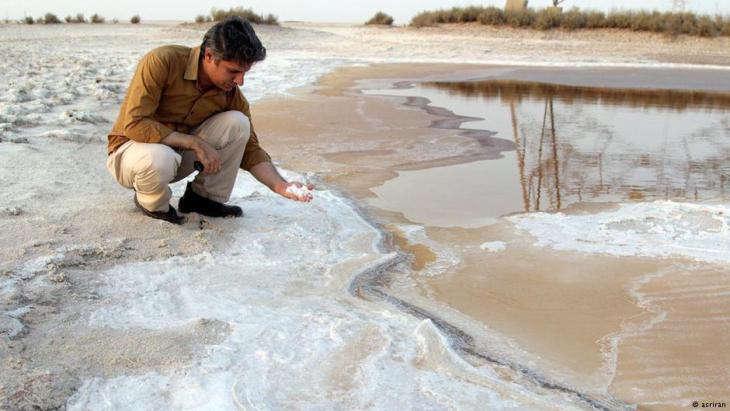
Issa Kalantari, head of the department, has warned several times since taking office last summer that if Iran does not fundamentally improve its water management, 50 million Iranians will have to abandon their hometowns over the next 20 years. The country has used up 97 percent of its ground water and if the current drought persists, Iran will gradually turn into a desert, says Kalantari.
And he should know. Because the 65-year-old is an agricultural and environmental expert who studied in the USA and was Iran's Minister of Agriculture for nearly 20 years. "I have written to the honourable leader of the republic: first solve the water problem before you promote a family policy designed to increase the population to 150 million," Kalantari already said at his inauguration last August. But Supreme Leader Khamenei is still set on raising the birth rate and stemming the growing rate of divorce.
Khamenei mainly to blame
Karroubi addressed his letter to Ali Khamenei because he rightly blames him the most for the desperate impasse the country finds itself in. His letter therefore begins with a quote from Khamenei's last speech in which he chided the country's former and current presidents, saying it was not right to hold responsible government positions for decades and then later act as members of the opposition.Karroubi quotes this very sentence, writing: "But you are the leader of the nation – and you are the one who has to answer to the people." Karroubi describes how over the past 30 years Khamenei has gradually usurped total power over the state, bringing the security forces, judiciary, media, foreign policy and the majority of the economy under his control. He delivers a damning indictment of Khamenei's 30 years of rule, asking with reference to the recent uprisings: "Did you hear the screams of the disenfranchised echoing for weeks through the remote stretches of the country?"
No peaceful transfer of power
Those protesting were once the grassroots supporters of the Islamic Republic, "And this was only the beginning," Karroubi warns. "To whom do you want to leave the country in this state? Do you really think that after you are gone the transfer of power will be smooth and free of violence?" he asks smugly. Earlier in the letter, he had described how Khamenei's son Mojtaba had intervened from off-stage in the most important decisions in domestic and foreign policy as well as in security matters – a jab at the debate about Khamenei's successor, which has in the past few weeks once again become a hot topic on social media.
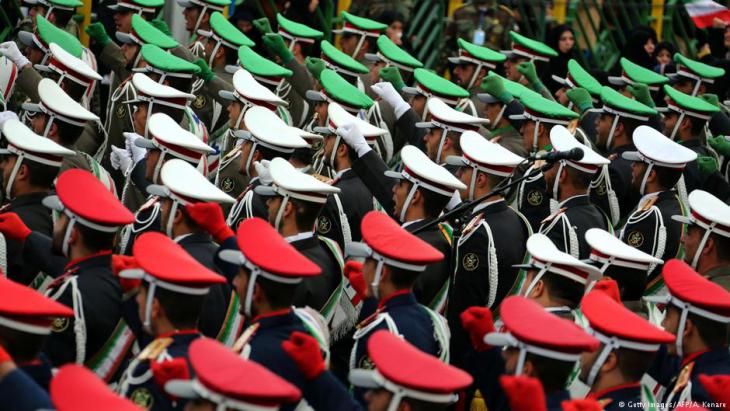
This open letter on the eve of the celebrations marking the 39th anniversary of the revolution, from the pen of one of the people there at that revolution's first hour at that, says a great deal about conditions in the Islamic Republic in its fortieth year.
There are daily reports these days of various occupational groups protesting in different cities: factory workers who have not been paid for months, teachers tired of putting up with arbitrary decisions by the authorities, people who have lost all of their savings after entrusting them to sham banks.
The state, that is to say the Revolutionary Guards and paramilitary organisations (the Basij militias) are maintaining a demonstrative silence. For now. And this at a time when U.S. President Donald Trump has accused Iran of being the stronghold for all of the bloody conflicts raging in the Middle East.
Are these domestic and foreign policy challenges really harbingers of a forthcoming second Syria? Musing about this eventuality is pointless and hypothetical, some say even counterproductive. Because the political developments in Iran are still unfolding in a peaceful, civilised and very resourceful manner.
Resistance – female, creative, peaceful
The best example of this inventive and clever non-violent protest is provided by a few women who since the beginning of the unrest four weeks ago have been demonstrating in their very own way against the dress code. These young women are turning their head scarves, mostly white as a symbol of peace, into flags, hoisting them on the main streets of the cities.
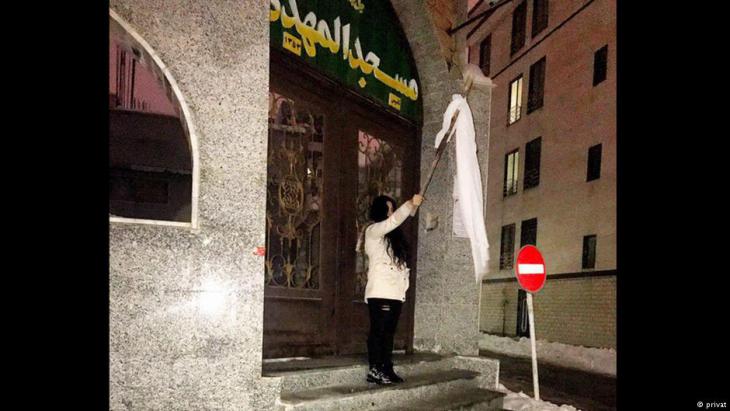
It all started with a 39-year-old mother in Tehran whose image went around the world. She was initially arrested but then released after three days. Dozens of young women followed her example in Iranian cities small and big. Only when this imaginative campaign met with a resounding response on social media did the security forces finally spring into action. The police recently arrested 29 women because they had allegedly been manipulated "by a foreign-controlled propaganda campaign" according to the headline published by the Tasnim news agency, which belongs to the Revolutionary Guards.
President Hassan Rouhani remarked at the tomb of the republic's founder, Khomeini, that it would not be possible to suppress the critical voices forever. It is an unwritten law in the Islamic Republic that the entire Cabinet gathers each year at Khomeini's grave on the anniversary of his return from exile. Rouhani gave a short speech there that provides an idea of how serious and dangerous the president considers the current situation in his country.
An anniversary like no other
The Shah's regime collapsed because the monarch ignored the voices of the people for too long. "And when he finally claimed to hear the voice of the revolution, it was too late," noted Rouhani in his short statement. After a deliberate pause, he then looked straight into the cameras and added: "We need to listen to the critical voices before it is too late."
On 11 February 2018, the Islamic Republic celebrated the 39th anniversary of the victory over the Shah's monarchy. It was a day for demonstrations of power. Just as every year, the country's leaders did their best to generate impressive images for their own television cameras and those of foreign reporters.
They are adept at the art of splendidly staged mobilisation, because they have had plenty of practice. This year, however, rumours were afloat that the dissatisfied citizens would also want to exploit the festivities for their own ends. As it turns out, it didn′t come to that. But the commissions and committees that had been working for weeks organising the official rallies and parades were remarkably restrained and cautious this year.
Ali Sadrzadeh
© Iran Journal 2018
Translated from the German by Jennifer Taylor
